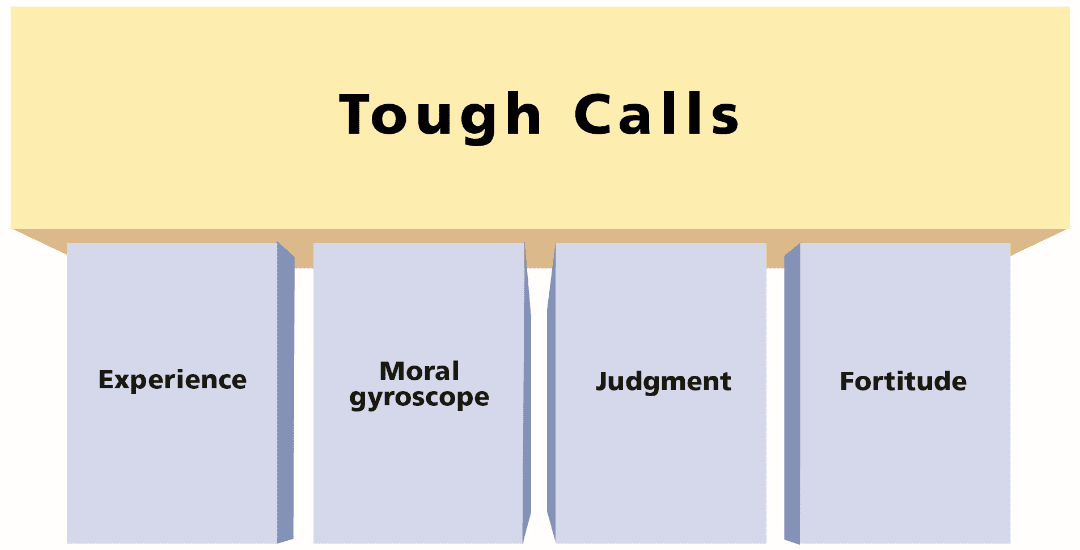Linda Henman offers some guidance on making the kinds of decisions that keep senior leaders awake at night. Among this sage advice: consensus isn’t all it’s cracked up to be and it’s probably time to put those sacred cows out to pasture.

Global economic turmoil has taught numerous lessons — the most important one: When leaders make good decisions, little else matters. When they refuse to make decisions or show a pattern of making bad ones, nothing else matters. Leaders should hear this as a clarion call, awakening us all to the fact that we can no longer afford the shortsighted luxury of considering decision-making a passive, pristine process. It’s not. It’s messy.
How did we fall into the trap of thinking of organizations in philosophical instead of pragmatic terms? Maybe when high-level leaders started shying away from tough calls, preferring to think of their organizations in abstract, ethereal terms like “culture.” We fare better when leaders realize that they create the climate of an organization through a series of daunting decisions — decisions that sometimes force trade-offs — sometimes scruffy, but ultimately advantageous trade-offs. These 10 steps define what leaders must do to make tough calls.
1. Kill Your Sacred Cows and “Resacralize”
Only those leaders who abandon conventional mindsets, challenge their own assumptions and kill their sacred cows can hope to survive and thrive in volatile global financial systems that continue to morph just as we start to understand them. These successful leaders live in harmony with complexity, speed, instability and ambiguity — to go beyond a competitive advantage to create an exceptional advantage. Leaders must continue to address the constructs of competitive advantage — cost advantage and differentiation advantage — but tomorrow’s reality demands more. The economic clarion will call leaders to create a “resacralizing” approach that further distinguishes their companies from all others, both now and in the future. Resacralizing involves removing the sacred status from an idea and questioning even whether the idea still has value.
2. Define an Ideal Outcome and Establish Criteria for the Decision
Be clear about what you’re trying to accomplish. Focus on outcomes, not inputs or methods. In other words, ask yourself “what” you’re trying to achieve before deciding “how” you’ll do it. Setting the criteria for an ideal solution will help get started.
If you want to increase profits next year, for example, you’ll need to determine the criteria for an effective solution. You might decide “we don’t want to increase revenue unless we increase our margins,” or “we want to limit our growth to existing facilities.” This sort of clarity will keep you from starting with an input (cutting costs) or with a methodology (eliminate jobs) that may or may not benefit the company.
3. Weigh Options
Brainstorm, analyze and estimate each option’s feasibility for achieving the goal. This becomes easier when you’ve set clear criteria. Whatever ideas surface, hold them up to scrutiny and continue to ask, “will this get us where we want to go?” Ask “why is this a good idea?” five times, and you’ll get closer to the ideal outcome.
4. Reject Easy Fixes, and Don’t Do Well What You Shouldn’t Do in the First Place
The status quo has become the most sacred of all cows when trying to make a really tough call. People find comfort in “that’s the way we’ve always done it” arguments. If it’s always worked to do it that way, then by all means, continue doing that. But those kinds of decisions don’t really qualify as “tough” decisions. When I hear this kind of argument or the “sunk cost” argument (“we’ve already spent so much time and money on that solution”), I ask, “if you weren’t already doing it that way, would you now decide that is the best option?”
5. Embrace Occam’s Razor
William of Ockham, a 14th-century English Franciscan friar, advised the shaving away of the unnecessary. This principle suggests parsimony, economy and succinctness in problem-solving. It states that the fewest assumptions should be selected — the fewer the better — even though more complicated conclusions might also prove correct.
Today Occam’s ideas face mockery every day in most organizations. We have let ourselves become mired in irrelevant but often interesting details because we fear that keeping things simple makes us unsophisticated and uninteresting — which might lead to our being unemployed. For each accepted explanation of a phenomenon, an infinite number of possible and more complex alternatives exists. These alternatives cost more in time and resources — and they cause distractions. Entities must not be multiplied beyond necessity.
6. Don’t Waste Time Trying to Get Consensus
A commitment to inclusive decision-making does not demand an equal obligation that all decisions will be unanimous. Usually consensus takes too long and causes the loss of time and resources. Instead, have clear lines of accountability about who will make what decisions and then delegate the authority to make the call.
7. Seek Input, But Eschew Unsolicited Advice
Seeking advice takes a certain degree of courage; rejecting unsolicited feedback takes even more. People with a strong commitment to self-improvement often eagerly and misguidedly take what they can get in terms of advice, analysis and assessment. They overlook the fact that feedback often says more about the need for the giver to say it than the receiver to hear it.
8. Anticipate Consequences
Those who show the most facility for making tough calls also demonstrate the ability to look into the future — to consistently and constantly balance risk and reward. They don’t catastrophize events, but they can foresee what others can’t. Frequently, they engage in scenario testing and entertain guesses about what the worst case would be. When they realize they can cope with the worst case, they have more confidence that they should take risks in the hopes that the best-case scenario will win.
9. Seek Success, Not Perfection
Perfectionists have the most trouble making tough calls. They steadfastly pursue every avenue of information, weigh pros and cons, seek more advice and generally delay the decision as long as possible. Those who recognize that perfection does not exist and that no human has the skills to obtain it relax and set their sights on success, not perfection. When they are 80 percent ready, they move, because they realize the time and money it would take to be 100 percent ready will lead to missed opportunities — and they still won’t have perfection.
10. Make the Call and Refuse to Second-Guess It
Guilt and its unattractive companion, worry, are the two most useless of human emotions. Guilt attempts to change the past, while worry serves as the futile effort to control the future. Successful leaders learn not to blame themselves or others for failures, but instead to accept them as a valuable way to learn and grow and as part of doing business. They know that if they don’t lose a game occasionally, they’re probably not playing in a tough enough league — and they condition themselves not to worry about it. Once again, perfectionists have the most trouble with second-guessing. It won’t help, but it seldom stops those committed to it from engaging in it.
We venerate our sacred cows, traditions and conventional approaches because they make us feel secure. But like all emotional security blankets, they unravel, and their usefulness fades. When we replace emotional responses with new attitudes and cognitive skills and challenge ourselves to take risks, reframe and live well-thought-out beliefs instead of clinging to what we’ve always done, we open the door for new opportunities and optimism. Making tough calls may involve the demise of some bovines, but it will also paint a credible picture of possibilities.



 Dr. Linda Henman is one of those rare experts who can say she’s a coach, consultant, speaker, and author. For more than 30 years, she has worked with Fortune 500 Companies and small businesses that want to think strategically, grow dramatically, promote intelligently, and compete successfully today and tomorrow. Some of her clients include Emerson Electric, Boeing, Avon and Tyson Foods. She was one of eight experts who worked directly with John Tyson after his company’s acquisition of International Beef Products, one of the most successful acquisitions of the twentieth century.
Linda holds a Ph.D. in organizational systems and two Master of Arts degrees in both interpersonal communication and organization development and a Bachelor of Science degree in communication. Whether coaching executives or members of the board, Linda offers clients coaching and consulting solutions that are pragmatic in their approach and sound in their foundation—all designed to create exceptional organizations.
She is the author of Landing in the Executive Chair: How to Excel in the Hot Seat, The Magnetic Boss: How to Become the Leader No One Wants to Leave, and contributing editor and author to Small Group Communication, among other works.
Dr. Henman can be reached at
Dr. Linda Henman is one of those rare experts who can say she’s a coach, consultant, speaker, and author. For more than 30 years, she has worked with Fortune 500 Companies and small businesses that want to think strategically, grow dramatically, promote intelligently, and compete successfully today and tomorrow. Some of her clients include Emerson Electric, Boeing, Avon and Tyson Foods. She was one of eight experts who worked directly with John Tyson after his company’s acquisition of International Beef Products, one of the most successful acquisitions of the twentieth century.
Linda holds a Ph.D. in organizational systems and two Master of Arts degrees in both interpersonal communication and organization development and a Bachelor of Science degree in communication. Whether coaching executives or members of the board, Linda offers clients coaching and consulting solutions that are pragmatic in their approach and sound in their foundation—all designed to create exceptional organizations.
She is the author of Landing in the Executive Chair: How to Excel in the Hot Seat, The Magnetic Boss: How to Become the Leader No One Wants to Leave, and contributing editor and author to Small Group Communication, among other works.
Dr. Henman can be reached at 






